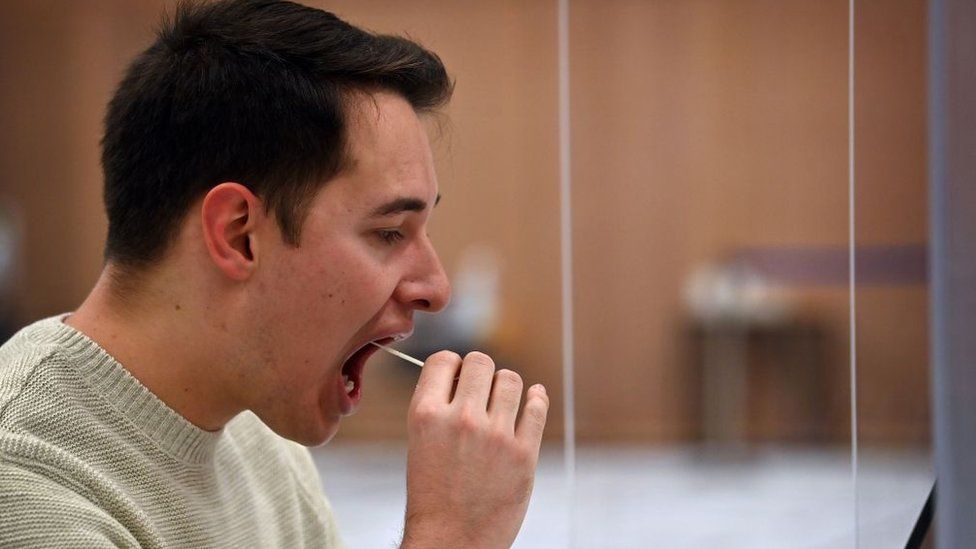Rollout of daily testing of close contacts paused in English schools

Getty Images
The government has paused plans to roll out rapid daily coronavirus testing of close contacts, in all but a small number of secondary schools and colleges.
Testing close contacts of a positive case as an alternative to isolation showed some benefits in trials.
But the emergence of a new variant means the risk of missing infections has risen, health officials say.
Regular testing of staff will now increase to twice a week.
Online teaching
More research is needed on how daily contact testing would work given the new, more transmissible, coronavirus variant, Public Health England and NHS Test and Trace say.
In the meantime, routine testing to pick up asymptomatic cases in staff and pupils remains a key part of the government’s plans.
Mass testing in schools, using pregnancy-style lateral flow tests to detect the virus, had been due to start in January.
However, under new lockdown restrictions, schools have had to switch to providing online teaching until February – although children of key workers are still allowed to attend – and plans were postponed.
How testing of pupils will be organised once schools reopen is still not clear.
- How worrying are the new coronavirus variants?
- School attendance higher than first lockdown
- Rapid coronavirus test use defended
The original plan for rapid Covid testing in all secondary schools and colleges included:
- seven days of daily tests for pupils who had been near a positive case
- daily tests for teachers if they had a case in their class
- routine weekly testing for teachers
The aim was to keep as many children in schools as possible by avoiding a whole bubble, class or year having to be sent home, and to reduce disruption from staff having to isolate.
But some scientists have consistently expressed concerns about the accuracy of the rapid tests, which do not need to be sent to a lab for the results.
They say the high number of false negatives means close contacts may wrongly think they are not infectious and go on to mix with more vulnerable people.
And now PHE and NHS Test and Trace say the new variant, which “increases the risk of transmission everywhere, including in school settings”, has made this a risk no longer worth taking.
“The balance between the risks (transmission of virus in schools and onward to households and the wider community) and benefits (education in a face-to-face and safe setting) for daily contact testing is unclear,” their statement adds.

- SCHOOLS: What will happen if children catch coronavirus?
- TESTING: How do I get a virus test?
- LOOK-UP TOOL: How many cases in your area?
- THE R NUMBER: What it means and why it matters
- TEST AND TRACE: How does it work?

A government spokesman said: “NHS Test and Trace and Public Health England have reviewed their advice and concluded that, in light of the higher prevalence and rates of transmission of the new variant, further evaluation work is required to make sure it is achieving its aim of breaking chains of transmission and reducing cases of the virus in the community.
“There is no change to the main rollout of regular testing using rapid lateral flow tests in schools and colleges, which is already proving beneficial in finding teachers and students with coronavirus who do not have symptoms.”
Published at Wed, 20 Jan 2021 16:03:39 +0000




Comments
Loading…